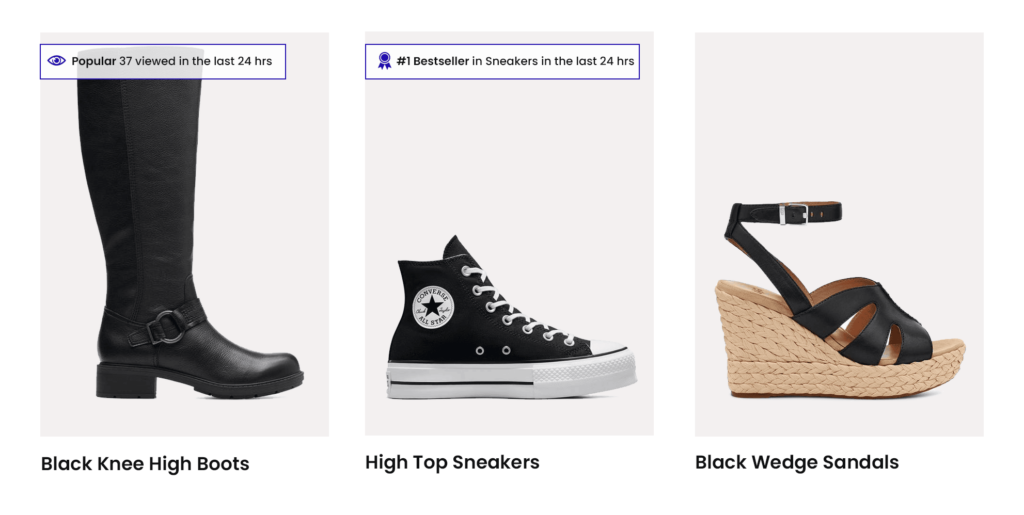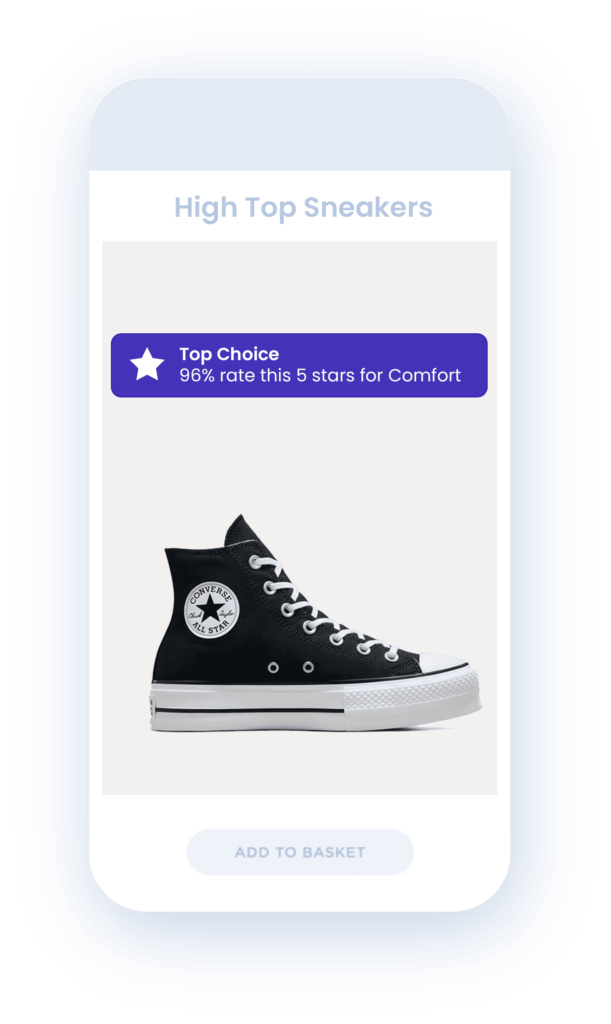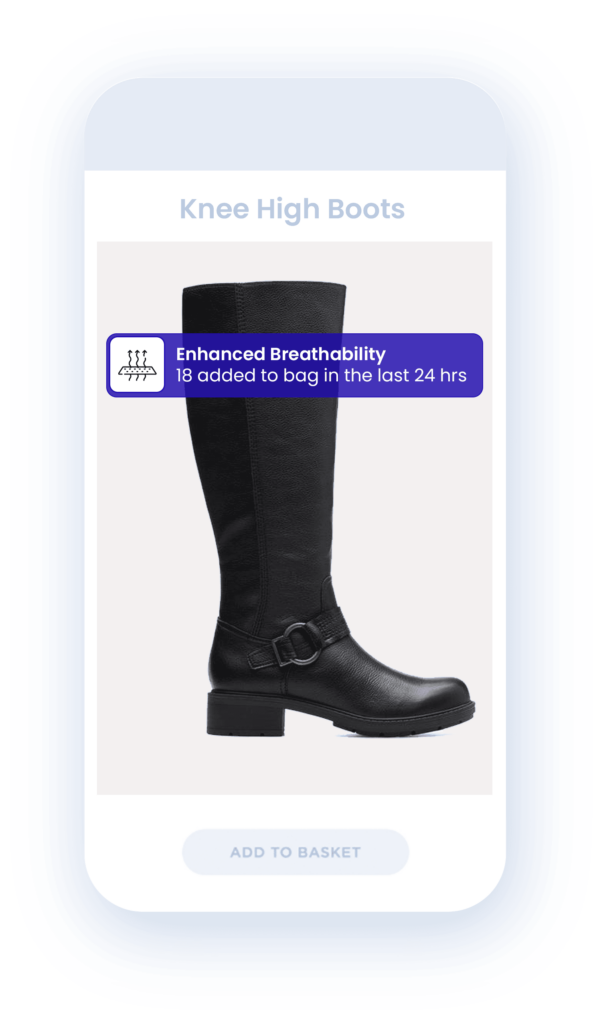Footwear has the second highest eCommerce returns with an average return rate of 18% (clothing takes the top spot at 25%), according to a January 2024 Statista survey. Shoppers often try on 4-5 pairs of shoes before they find a comfortable fit, so it is not surprising that the most common reason for online footwear returns is sizing. Supporting these facts, a study by the British Footwear Association found that the average eCommerce return rate is 2-3 times higher than for in-store purchases where shoppers can try on before they buy.
Globally, online footwear sales are forecast to increase by a compound annual growth rate of 6.8% between 2022 and 2028, thanks in part to the strong demand for footwear in both the UK and the US. eCommerce sales are predicted to account for nearly 40% of footwear sales worldwide by 2027.
In the U.S. there is a heightened focus on versatility, comfort and sustainability. According to the Future of Footwear forecast by the NPD Group, consumers are increasingly looking to maximize versatility and are prioritizing casual everyday shoes and comfort. As a result, the blurring of fashion and athletic footwear continues. Casual footwear, sneakers, and athletic footwear are likely to be considered necessities compared to non-essentials like dress footwear and slippers. This supports a trend that Taggstar’s footwear brands and retailers are sharing with us – that heels are out, and flats and sneakers are in!

What are the main challenges in eCommerce for footwear brands?
- High Return Rates Due to Fit Uncertainty
Footwear has one of the highest eCommerce return rates because customers can’t try on products before purchasing. Sizing varies between brands and styles, leading to frequent issues with fit. These returns are costly, affecting both profit margins and customer satisfaction. - Inconsistent Sizing Across Materials and Styles
Footwear designs differ significantly in material and structure, which complicates standard sizing. Without the ability to tailor sizing guides for each product type, customers may struggle to select the best fit, which increases the likelihood of returns and exchanges. - Demand for Personalized Shopping Experiences
Today’s customers expect recommendations that align with their style and fit preferences, yet many eCommerce platforms for footwear lack the tools to offer this level of personalization. Brands that fail to provide a personalized shopping experience may struggle to capture and retain customer loyalty. - Building Customer Trust and Purchase Confidence
Without the tactile experience of in-store shopping, customers are often hesitant to buy footwear online. Using social proof tools—such as reviews, popularity indicators, and real-time purchase data—can help establish trust and help shoppers make more informed purchase decisions, reducing return rates and boosting customer satisfaction
Returns: A challenge for footwear retailers and consumers alike
For online retailers and shoppers alike, there are challenges to the return of footwear bought via eCommerce. As with clothing, some shoppers buy multiple sizes to ensure that they get the perfect fit – also known as bracketing.
While this practice of bracketing is challenging enough in clothing, the problem is exacerbated in footwear. Footwear orders are usually shipped in large boxes that are bulky and weighty. That makes it inconvenient for the shopper and costly both financially and environmentally, for the eCommerce retailer.
Investing in solutions such as social proof messaging to reduce footwear returns
Reducing footwear returns can be done by improving the online customer experience with social proof. By implementing social proof, eCommerce retailers are able to show what other customers are browsing for and buying to help hesitant shoppers make better purchase decisions. Social proof messaging uses a range of real-time data to present a variety of message types that can help shoppers buy footwear online by answering crucial questions such as ‘Are they popular? Do they fit well? Are they comfy? Which one is a Best Seller?’

This added assurance is available by integrating review messaging, such as aggregated sizing and fit reviews or quality assessments, into social proof messages. And that helps footwear shoppers understand how other customers have rated products that they can’t try on themselves.
This understanding of fit and comfort is particularly important in footwear since while we all may get away with a top that’s a little snug or uncomfortable, ill-fitting shoes will soon lead to blisters and discomfort. Attribute Messaging, meanwhile, can help highlight particular attributes, such as vegan leather shoes or technical materials for sports enthusiasts, that footwear shoppers might be looking for when shopping online to make a confident buying decision

Why footwear retailers are turning to social proof to help
Many fashion and footwear retailers already rely on social proof from Taggstar to improve the online customer experience for their shoppers and significantly increase conversions. Our customer base includes specialist footwear retailers, such as Sportsshoes.com, as well as multi-category retailers that also sell footwear via eCommerce, such as Fabletics, M&S and The Very Group.
These retailers and many more are taking proactive steps to reduce footwear returns by using social proof in their eCommerce operations. Isn’t it time for you to take a step in the same direction? Contact us now to find out how we can drive up conversion and reduce returns for your business.



